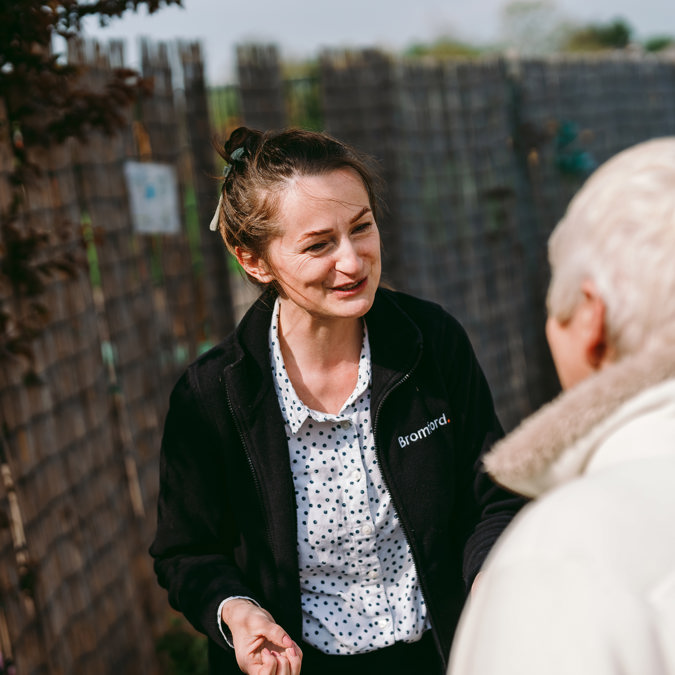Our customer portal is now unavailable until 8am Monday 21 October while we make some improvements.
On this page
- Our approach to safeguarding
- How harm and abuse are categorised
- What to do if you have a concern
- Reporting a concern about a Bromford colleague
- Support for domestic abuse and safeguarding
- Safety planning for domestic abuse
- Requesting information under Clare’s law
- Useful websites for safeguarding
- National safeguarding organisations and advice lines
Our approach to safeguarding
Safeguarding is about protecting the health, wellbeing, and human rights of those at risk, enabling them to live safely, free from abuse and neglect. It involves individuals and organisations working together to prevent and reduce both the risks and experience of abuse or neglect.
We are committed to ensuring that all our colleagues act appropriately and work in partnership with customers and other organisations to ensure the safety of all. We take safeguarding seriously for both adults and children.
How harm and abuse are categorised
There are various forms of harm and abuse that can affect children and adults, including:
- physical abuse
- psychological or emotional abuse
- financial or economic abuse
- sexual abuse
- neglect or acts of omission
- organisational abuse
- self-neglect
- domestic abuse
- modern slavery
- discriminatory abuse
- radicalisation, terrorism, and extremism
What to do if you have a concern
if it's an emergency
If there is immediate danger, call the police on 999.
If it's not an emergency
- Report it to the police on 101 for non-emergencies
- If the concern relates to a Bromford customer, you should report it to us
- For concerns about a child under 18, call NSPCC on 0808 800 5000
- Report cases of abuse or suspected abuse to your local authority's social care team
Domestic abuse
Domestic abuse includes any controlling, bullying, threatening, or violent behaviour between people in a romantic relationship or between close family members. This may include:
- physical or sexual abuse
- violent or threatening behaviour
- controlling or coercive behaviour
- financial or economic abuse
- psychological, emotional, or other abuse
- digital abuse (such as sexting)
Read our domestic abuse policy
Support for domestic abuse and safeguarding
If you or someone you know need support, these organisations can provide help:
- Refuge – Call 0808 2000 247
- Women’s Aid – Live chat
- Respect Men’s Advice Line – Call 0808 8010327
- LGBT+ Domestic Abuse Helpline – Call 0800 9995428
- National Stalking Helpline – Call 0808 802 0300
- Honour Based Abuse Helpline – Call 0800 5999 247
- Action on Elder Abuse – Call 0808 808 8141
Safety planning for domestic abuse
If you are in an abusive relationship, it’s important to have a safety plan. Here are some useful resources and apps:
- Hollie Gazzard App – A safety app for discreetly notifying trusted contacts
- Bright Sky App – Support and resources for those at risk of domestic abuse
- Women’s Aid Survivor’s Handbook – Comprehensive guidance on safety planning
- MyPlan App – Helps you create a personal safety plan
In public spaces, you can discreetly seek help using these methods:
- Ask for Angela – Available in pubs and restaurants
- Ask for Ani – Available in pharmacies across the UK
Requesting information under Clare’s law
You can request information about a partner's history of abuse under Clare’s law (Domestic Violence Disclosure Scheme). More information is available on Gov.uk or Wikipedia.
Digital abuse
Digital abuse, such as sexting or unauthorized access to personal accounts, can be just as harmful as other forms of abuse. Take these steps to protect yourself:
- passwords and security – use strong, unique passwords and enable two-factor authentication
- location tracking – be mindful of location-sharing features on your devices and apps
Learn more about staying safe from sexting by visiting the NSPCC guide on sexting. You can report digital abuse here.
Useful websites for safeguarding
For more information and resources on safeguarding, visit these trusted websites:
- Gov.uk – Protecting vulnerable adults
- Gov.uk – Modern slavery
- Gov.uk – Report child abuse
- Gov.uk – Safeguarding children
- NHS safeguarding
- NHS – Safeguarding pocket guide
- Age UK – Safeguarding older people
- Social Care Institute for Excellence
National safeguarding organisations and advice lines
These organisations can provide guidance and support in safeguarding situations:
- NSPCC – Call 0808 800 5000
- Children’s Society
- Learning NSPCC
- Child Protection Company – Call 01327 552030
- Action for Children
- Victim Support – Call 0808 16 89 111
- Crimestoppers – Call 0800 555 111
- Action on Elder Abuse – Call 0808 808 8141
- Galop - LGBT+ Hate Crime Helpline – Call 020 7704 2040
Reporting a concern about a Bromford colleague
If you have a safeguarding concern about a Bromford colleague, you should get in touch with us. Your report will be investigated and kept confidential.
Report a safeguarding concern
If there is immediate danger, call the police on 999.
If there is no immediate danger you can call the police on 101.
You should report cases of abuse or suspected abuse to your local authority social care teams.
If the concern is about a Bromford colleague or customer please also call us on 0330 1234 034,

Our policies
-
View Safeguarding policy
Safeguarding policy
File type PDF -
View Domestic abuse policy
Domestic abuse policy
File type PDF


